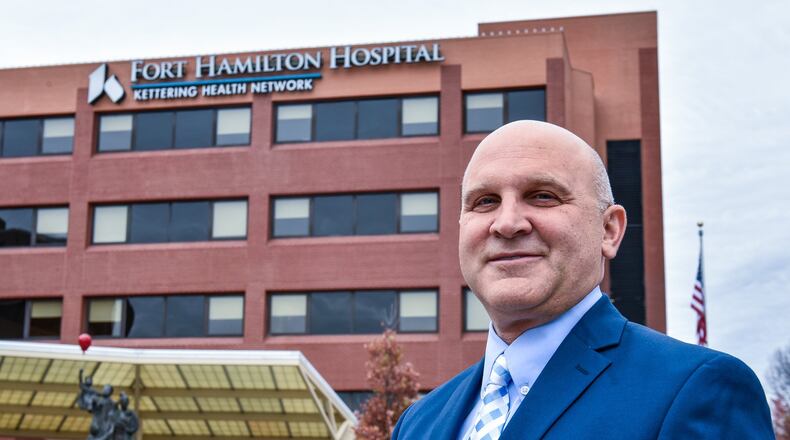“Usually you come into a new position and you’re looking at eventually making some significant changes,” according to Ron Connovich, who started in the role in October. “I gotta tell you, the team that is here, there’s no changes necessary. It was quite a pleasant surprise, to be honest.”
He succeeded Michael Mewhirter, who had served in the role since June 2016 and was appointed vice president of finance for the Grandview Medical Center System, part of Kettering Health Network, which includes eight hospitals, 11 emergency departments, and 120 outpatient facilities serving southwest Ohio.
FIRST REPORT: Fort Hamilton Hospital has new leader, Kettering Health Network announces
Connovich, who has more than 30 years of health care experience in finance and operations, joined Kettering Health Network in 2012 as chief operating officer and chief financial officer for Greene Memorial Hospital in Xenia and Soin Medical Center in Beavercreek.
“I have seen all different aspects of health care, from the operation to the finance, from a well-running organization to turnarounds,” he said. “I think … having that perspective all the way around, well-rounded, has uniquely prepared me for Fort Hamilton.”
The hospital, he said does “very well” in terms of employee engagement, judging by positive comments and feedback.
“They’re like a family,” he said. “They’re very close-knit. They’ve worked together for many, many years.”
Building a new team at Fort Hamilton, like he did when Soin Medical Center launched six years ago, is much different than coming into a hospital where the staff is “well established and working together.”
MORE: Fort Hamilton Hospital adding community physicians, expanding services
Connovich said his long-term vision for Fort Hamilton Hospital is to make it “the health care of choice in Butler County.”
The hospital is “well-positioned” to do that with the physicians and synergies that it has, he said.
“Being a part of Kettering Physician Network, we have over 600 providers,” Connovich said. “It’s different than even a Christ Hospital or the others in the area. I think that we’re much better positioned and … we’ve been a partner in the community for almost 90 years. We’ve got very tight connections to the community. We’re going to be here and we plan to stay.”
Fort Hamilton, under his leadership, will work to change various programs, and certifications, including working to become Primary Stroke Certified by the end of the year, Connovich said.
He’s also looking at augmenting the hospital’s emergency department services and “taking them to the next level.”
MORE: New health care center to open in Hamilton by next spring
Connovich said he is “very participatory” when it comes to the way he runs an operation and that he believes in using group-think sessions to work toward solutions.
“I believe that people, when they come together and share ideas and thoughts and opinions, come out with a much better outcome than just a single individual,” he said. “But I don’t let grass grow under my feet either, so once we’ve discussed, we make a decision, we move forward.”
Fort Hamilton became faith-based Kettering Health’s seventh member is 2010. Connovich said the hospital is “more than just a business.”
“It’s a mission, as well, and I’m very excited that we’re a part of Kettering Health Network in that Kettering is faith-based,” he said. “That’s one of the things I want to bring out a little stronger at Fort Hamilton.”
MORE: 5 things to know about area’s new $36M medical facility
Shortly after starting in the new role, Connovich organized a group of employees to work on putting scripture quotes around the hospital. The hospital, which has a group that collects prayer requests for any patient or employee, also is adding to its chaplaincy program.
“It’s the spiritual element that I think is important as part of the healing process,” he said. “We encourage our employees to pray with family, to talk about God. We may provide the best technical health care, but when you bring God into that component as well, I think the outcomes are even better.”
About the Author

